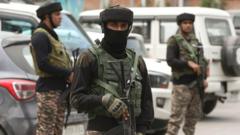

Despite India's strong objections, the International Monetary Fund (IMF) recently approved a $1 billion loan disbursement to Pakistan as part of its Extended Fund Facility (EFF). This decision highlights the complex interplay of economics, geopolitics, and international relations. While India has voiced concerns about Pakistan's track record and the potential misuse of funds, it appears that several factors have limited India's ability to prevent the IMF bailout.
One of the primary reasons India couldn't block the bailout is the IMF's decision-making structure. The IMF's Executive Board, composed of 25 directors representing member countries, makes decisions based on consensus. Unlike the United Nations, where each country has one vote, the IMF's voting power is determined by the economic size of each member. While India is a member of the board, its voting share is limited, and it cannot single-handedly veto a decision. In this instance, India abstained from voting, as there is no option to formally vote against the proposal. Abstention served as India's tool of protest.
India's main concerns revolve around the efficacy of IMF programs in Pakistan, given its history of poor compliance and the potential for funds to be used for state-sponsored cross-border terrorism. India has pointed out that Pakistan has a long history of seeking financial assistance from the IMF, with multiple bailouts in the past decades. Despite this assistance, Pakistan continues to face economic challenges, leading India to question the effectiveness of the IMF's approach. India has also raised concerns about Pakistan's military having a deep engagement in economic affairs, posing substantial risks to policy execution and long-term reforms. Moreover, India has cautioned that IMF bailouts may allow Pakistan to redirect domestic resources towards its military and intelligence apparatus, indirectly enabling cross-border terrorism.
Despite these concerns, the IMF justified its disbursement to Pakistan based on the country's progress in implementing economic reforms. The IMF has stated that Pakistan has made progress in stabilizing its economy, initiating reforms, and addressing its balance of payments problems. These steps include implementing carbon levies, increasing energy tariffs, and liberalizing the auto sector. The IMF also approved a $1.4 billion loan under the Resilience and Sustainability Facility (RSF) to support Pakistan's efforts in building economic resilience to climate vulnerabilities and natural disasters.
Furthermore, the IMF operates primarily on economic considerations, focusing on whether a country meets its reform promises. While geopolitical factors can play a role, the IMF's mandate is to provide financial assistance to countries facing economic difficulties, provided they adhere to the agreed-upon conditions. The United States, as the IMF's largest shareholder, also plays a significant role.
In conclusion, while India has strong reservations about the IMF's bailout of Pakistan, its ability to prevent it was limited by the IMF's decision-making structure, the IMF's focus on economic reforms, and the geopolitical considerations of other member countries. India has strategically used its abstention to voice its concerns and highlight the risks associated with providing financial assistance to Pakistan. The situation underscores the complex challenges of balancing economic assistance with security concerns in a volatile geopolitical landscape.